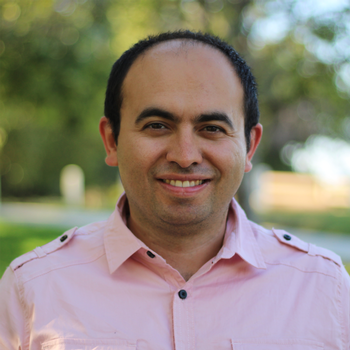Young Scholar Interview with Dr. Ahmet Coskun

Bio:
Dr. Coskun is currently an Assistant Professor of Biomedical Engineering at Georgia Institute of Technology and Emory School of Medicine. Previously, Dr. Coskun was an Instructor at Stanford University School of Medicine, working with Prof. Garry Nolan as a faculty member at Stanford University. Dr. Coskun is an alumnus of the Ignite Entrepreneurship Program at the Stanford University Graduate School of Business. He is a recipient of the Burroughs Wellcome Fund CASI Award, National Institutes of Health K25 Career Award, and Leukemia & Lymphoma Research Fellowship.
Dr. Coskun trained with Prof. Long Cai at California Institute of Technology for his postdoctoral work in systems biology. He received a Ph.D. degree in Electrical Engineering from the University of California, Los Angeles under the mentorship of Prof. Aydogan Ozcan and bachelor’s degrees in Physics and Electrical Engineering from Koc University, Turkey.
Dr. Coskun researches single cell proteomics and genomics, precision medicine, and biophotonics. Using quantitative multiplex imaging and computational analysis tools, Dr. Coskun explores how “spatial” nature of cell-to-cell interactions and subcellular variations lead to fascinating developmental programming in healthy individuals and devastating abnormal formation in leukemias and breast cancers. Dr. Coskun promotes the use of Bioart and Nanoart for teaching, entrepreneurship in biotechnology, and Open Science to liberate scientific progress.
For more information please visit this website: http://singlecell.bme.gatech.edu
Interview:
1) Would you please tell us about yourself and your journey that led you to become a scholar.
I am a quantitative researcher. Numbers, correlations, and associations of things have become my long-standing interest. My college education was on Physics and Electrical Engineering at Koc University, Turkey. I studied light-matter interactions to manipulate living systems at the nanoscale. My graduate experience at UCLA was on development of unconventional imaging systems in a Computational BioPhotonics lab, working under life-changing mentorship by Prof. Aydogan Ozcan. My initial postdoctoral training was at Caltech, where I explored new molecular profiling methods of life at the single cell level. I then completed my mentored training at Stanford University with visionary Prof. Garry Nolan, allowing to expand my research in visualizing subcellular life. Currently, I serve as an Assistant Professor at Georgia Tech, where I continue modeling spatial molecular interactions in health and disease. Bioimaging, biodynamics and biocomputation are my passion. Curiosity-driven research has been my practice. Never stopped questioning. I have contributed to new technologies that have found significant use in understanding of health and diseases.
2) Tell us about your research and how it is related to everyday life or other fields.
Initially, I was part of team that developed portable laboratories to diagnose diseases at home. I then studied how molecular distributions define different cell types with unique functions. In my research program, I now study how three-dimensional maps of molecules in cells regulate response to infections and cancer initiators. As a result of these efforts, we will understand underlying causes of life-threatening conditions as early as possible to save more patients. We are always excited to work with curious minds to broaden our horizons in biotechnology with our research team at Georgia Tech.
3) What do you consider important to your success? Tell us about any
skills or habits that you think helped you to become a successful scholar at such a young age.
Positive thinking is key. Research is demanding. We try new things that nobody else tried before. We obtain either good or bad outcome in our work. In any case, a lesson is to be learned. Team-work is productive. Others provide complementary experience. Researchers should always be open to share ideas. Random opportunities, a coffee-break discussion and an elevator-chat, give inspirations and solutions. Systematic progress is enabler. Goals are better achieved with divide-and-conquer strategy.
4) What are your immediate and long-term goals for the future?
My near-term goals involve dynamic and adaptable learning experiences in technology and biology. I aim to sustain background to evolve multi-disciplinary language. When we chat with engineers, scientists, and clinicians, we should be able to translate to our research findings.
My long-term passion is translational impact. Discoveries should change the life of others. Public should be able to use our devices and solutions without further training and learn their wellness. Professionals should employ our findings to revisit the current medical practice toward treatment of patients.
5) What do you recommend to aspiring scholars, or to young Turkish scientists/scholars who are at the beginning of their careers?
They should find their strengths and explore opportunities to nurture them. Environment is critical. Young scientist should pursue ideal training with good mentors. The definition of “good” is subjective, but they should consistently try, fail, and succeed. International experience is important. They should be part of the teams that have a track-record of driving their fields.
6) Could you please tell us about your life outside of your work? Do you have hobbies? What are your favorite activities? If you recommend a book, what would that be and why?
Quality time is my hobby. I find that in nature. I love to go for hiking and sight-seeing in forests and waters. Experiencing historical places has been refreshing in my outside life. I recommend reading the life story of Steve Jobs. There are multiple resources, but the main take-home message would be on how to pursue the dream with simplicity and how to cope with demanding situations.